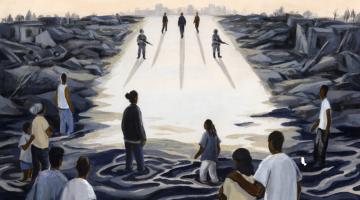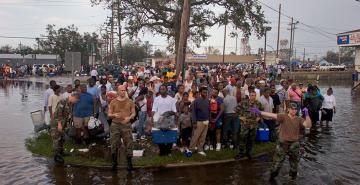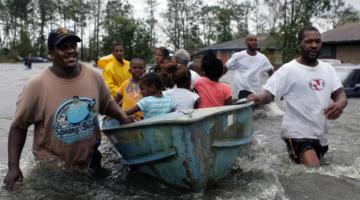Throughout their history the police have reliably served the interests of white supremacy.
“While we may not be able to fix policing, it might be possible to abolish it.”
In this series, we ask acclaimed authors to answer five questions about their book. This week’s featured author is Kristian Williams. Williams isthe author of American Methods: Torture and the Logic of Domination, Hurt: Notes on Torture in a Modern Democracy, and Fire the Cops!His new book is Our Enemies in Blue: Police and Power in America.
Roberto Sirvent: How can your book help BAR readers understand the current political and social climate?
Kristian Williams: I doubt that your readers need to be told that police brutality and racism are real problems. But the history I recount in Our Enemies in Blue may help make sense of why the institution operates the way that it does. Looking at the history of policing from the slave patrols to our current period of militarization and mass incarceration, I argue that racism and violence are central to the institution's function. In other words, rather than ask why the institution doesn't do what it is “supposed” to do—bringing justice, protecting the innocent, etc. —I think we get further by starting with what it does do, and then looking for the reasons it does that. Taking that approach, and recognizing that throughout their history the police have reliably served the interests of white supremacy, we may get a clearer idea of what the role of the police really is, and it also tells us something about the centrality of racism to our entire society.
What do you hope activists and community organizers will take away from reading your book?
I hope that if we can better grasp the role of the police in our society, that understanding will inform our strategy for change. So much of what the cops do can seem arbitrary, pointless, and simply stupid. I mean: racial profiling, rousting homeless people, focusing on minor offense like street-drinking—in other words, the day-to-day business of policing—from a crime-control standpoint, none of those activities make a whole lot of sense. However, if the point is to use the criminal legal system to marginalize and control poor people and people of color, the utility of those tactics is obvious. By supplying an analysis at the level of the institution as it has arisen and been shaped in history—that is, not simply this or that incident, or this or that policy—I hope to make apparent the logic that is at work, the function that is actually being fulfilled. And then, I want to help people to move beyond trying to reform the existing institution, to think outside of the framework of policing and to imagine other ways of resolving conflict and ensuring public safety.
We know readers will learn a lot from your book, but what do you hope readers will un-learn? In other words, is there a particular ideology you’re hoping to dismantle?
I think if we are going to understand the institution of policing, if we want to make sense of the things the cops actually do, we need to stop thinking of them as being chiefly crime-fighters. That is certainly an important element to the cops’ self-image, and even more important for their public image. We've all been taught to understand them that way, in formal and informal ways, from high school civics class to every episode of Law and Order. But it does not reflect the reality of their work or of the way the institution has developed historically. If we think of the police in strictly legal terms, the illegal aspects of policing become completely incomprehensible. The lawlessness of law enforcement seems like an irresolvable contradiction. If the point is to uphold the law, then the illegal searches, excessive use of force, and routine perjury—again, policing as it is actually practiced—would all be self-defeating. But the law is clearly not the most important thing about police work. It tells us relatively little about what the police will do. On the other hand, the cops reliably act in ways that preserve the hierarchies structuring our society, especially those of race and class. If we can give up the notion that the cops are there to enforce the law, it becomes possible to see the power relations that actually drive their actions.
Who are the intellectual heroes that inspire your work?
In terms of clear writing and the willingness to stare reality in the face, I would have to say George Orwell has done more than anyone else to shape my intellectual outlook. (My most recent book, Between the Bullet and the Lie, is a collection of essays about Orwell.) In terms of a purely moral motivation, as I worked on Enemies, whenever I felt myself start to lose focus, I would turn to James Baldwin's essays. His tone of calm outrage stirred something in me, and more than once helped me to keep working through the various frustrations and inevitably accompany a book project. I quote both Orwell and Baldwin in epigrams to individual chapters, each referring to the police and “enemies,” which of course I echo in the title.
“Zinn urged us to hold ourselves to the basic standard of intellectual honesty.”
But, without doubt, the person who had the greatest influence on my approach to history is the late Howard Zinn, author of A People's History of the United States. His view of history “from below,” and his efforts to make it interesting and accessible to a general audience are worthy of emulating. I had the good fortune to see him lecture during my senior year at Reed College. The theme of his speech, as he put it, was the importance of not being a professional. But really, his argument was about not letting the standards of professionalism get in the way of being a decent human being. He urged us, as aspiring intellectuals, not to be constrained by false claims of neutrality or impossible demands for objectivity, but to hold ourselves to the basic standard of intellectual honesty and the demands of our own conscience. He thought that the role of the intellectual was not to be above the controversies of the time, but to engage with them, to take sides.
In what way does your book help us imagine new worlds?
At the end of the book I propose that, while we may not be able to fix policing, it might be possible to abolish it. The argument is that, if we accept that this institution arose at a particular point in history, in response to specific social conditions, then it follows that further social change could eliminate it. That ultimately requires that we find other ways of ensuring public safety, responding to emergencies, and resolving conflicts; and beyond that, that we imagine a society without the inequalities that the police work so diligently to preserve. I purposefully avoid utopian schemes, however, and instead look to actual historical cases where social conflict reached such a point that the public stopped looking to the state to address problems relating to crime and violence, and turned instead to liberatory social movements. To varying degrees something like that has happened in the US during the Seattle General Strike, during the Black Liberation struggle, and in the women’s movement both in the seventies and more recently. Overseas I also look in some detail at the various experiments arising as part of the anti-apartheid movement in South Africa, and connected to the Troubles in Northern Ireland. All of those examples have their limitations, and they all invite a certain amount of criticism, but they also point to some pretty exciting possibilities and go some way to showing that things can be different.
Roberto Sirvent is Professor of Political and Social Ethics at Hope International University in Fullerton, CA. He also serves as the Outreach and Mentoring Coordinator for thePolitical Theology Network. He’s currently writing a book with fellow BAR contributor Danny Haiphong called American Exceptionalism and American Innocence: A People’s History of Fake News—From the Revolutionary War to the War on Terror.
COMMENTS?
Please join the conversation on Black Agenda Report's Facebook page at http://facebook.com/blackagendareport
Or, you can comment by emailing us at comments@blackagendareport.com



















